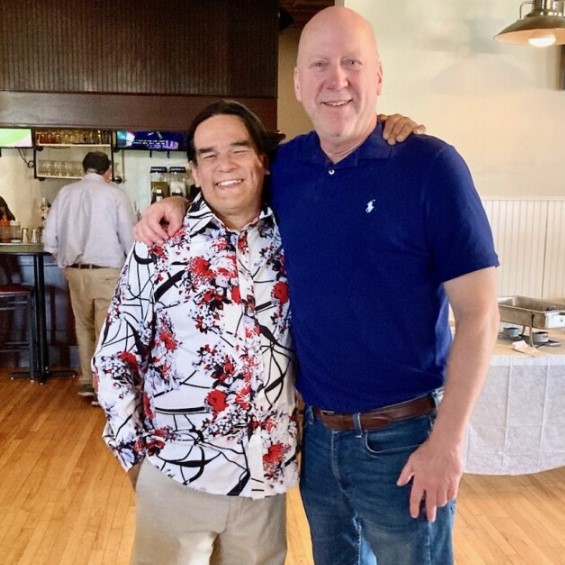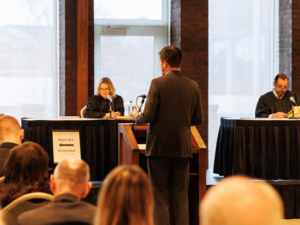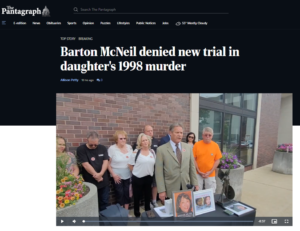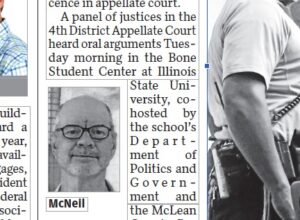2021 June 16 News Article – After 18 Exonerations, John Hanlon to Retire From Illinois Innocence Project

ARTICLE INTRODUCTION COMMENT BY WEBSITE AUTHOR: For those unfamiliar, John Hanlon is an attorney in Illinois that has been spearheading the reversal of Barton McNeil’s wrongful conviction beginning in 2012 and is now retiring. In his place representing Barton McNeil as lead counsel is Karl Leonard of the Exoneration Project. Barton and his family is sad to see John leave but know he will be in the wings ensuring Barton receives the freedom he deserves.

WGLT | By Edith Brady-Lunny
Published June 16, 2021 at 1:22 PM CDT
LISTEN • 7:03

When John Hanlon started his career as a lawyer in 1983, he knew of only one case where an innocent person had been cleared of a crime: Sam Shepphard, the Ohio physician exonerated in 1966 of killing his wife.
“When we got a case to work, it was not with innocence in mind,” said Hanlon, who will retire June 30 as executive director of the Illinois Innocence Project at University of Illinois Springfield. Over the past 12 years, Hanlon and a team of lawyers, students and volunteers has helped exonerate 18 defendants.
The idea that innocent people were serving time in prison was not a concern for Hanlon and other young lawyers. Innocence projects — organizations that examine convictions where serious doubt has been raised about a person’s guilt — did not exist. The game-changing discovery of DNA with a potential to exclude a person as a suspect or identify the real culprit had not been made.
“Back then, if there was a confession, that’s always bad and the person is undoubtedly guilty. If there’s an eyewitness, same thing — always really bad and the person is guilty …. How wrong that proved to be,” said Hanlon.
In 1985, as a lawyer with the Office of Illinois Appellate Defender’s Capital Litigation Unit, Hanlon was given a chance to work on his first death penalty case: the appeal of Rolando Cruz’s murder conviction in the rape and murder of 10-year-old Jeanine Nicarico in DuPage County.
“Little did I know that would really define my career,” Hanlon, 63, said of the case.
The state pushed on with its case against Cruz and three other young men, despite a confession by serial killer and rapist Brian Dugan to the crime. Dugan killed another child and a woman before he was arrested and admitted to killing Nicarico in 1982. Cruz was convicted a second time and granted a third trial before he was acquitted.
Hanlon has stayed in contact with Cruz, a man he describes as “a great father” to four children.

The abolition of the state’s death penalty in 2011 ended the need for OSAD’s death penalty unit. Springfield attorney Larry Golden approached Hanlon about coming to work for what was known as the Downstate Innocence Project.
Plenty of cases
Illinois’ cringeworthy track record for locking up innocent people has produced no shortage of cases for the IIP and two other innocence organizations in the state. With 372 exonerations (including four in McLean County), Illinois is second only to Texas in the number of exonerations awarded since 1989. Nationwide, almost 2,800 people have been cleared of criminal charges, according to the National Registry of Exonerations.
Since 2012, the IIP has received 4,000 requests from defendants claiming innocence.
“It’s daunting,” said Hanlon.
The project turns down about 95% of the requests for assistance. Those that are accepted usually have one or more red flags that raise questions about the conviction, said Hanlon.
Among those red flags: “Is this case supported by anything more than a confession? Is there anything more than an eyewitness? Is there a jailhouse snitch, because sometimes that indicates a little bit of desperation on the part of a prosecutor, if they use a snitch. What county is it from, because wrongful convictions sometimes occur in certain counties more than other counties?”
With 230 convictions tossed since 1989, Cook County leads the nation among counties with wrongful convictions. Cook County’s horrific history is exemplified by the 2009 establishment of the Illinois Torture Inquiry and Relief Commission to investigate tactics used by police against suspects, said Hanlon.
“That’s just terribly sad, but necessary,” Hanlon said of the commission.
The work of uncovering the truth sometimes includes defense lawyers with long-held beliefs about their client’s innocence and police officers who cannot let go of their doubts about a suspect’s guilt. A 2012 letter from two Aurora police officers bolstered Hanlon’s belief that the majority of those working in the criminal justice system support true justice.
The Aurora officers pursued information that John Grayson, a man behind bars for 12 years, was innocent. Efforts by the officers and IIP led to Grayson’s release.
“I’m so proud of those officers and the other officers who do the right thing,” said Hanlon.
The majority of convictions are valid, said Hanlon, and based on legitimate evidence or a defendant’s valid confession. But estimates that about four percent of death row inmates and 11 percent of defendants in all cases are innocent cannot be ignored, noted Hanlon.
With about two million people incarcerated in the U.S., the potential that so many innocent people may be serving time “is not acceptable,” he said.
In addition to the services IIP staff provide to clients, the group also works with lawmakers to address the red flags that contribute to wrongful convictions. In 2018, Hanlon helped usher in landmark legislation on jailhouse informants. Pre-trial hearings to determine an informant’s reliability are now required under the legislation.
In May, a bill crafted with assistance from IIP attorney Lauren Kaeseberg ended the practice that allows police to deliberately mislead minors during questioning.
“This is an attempt to straighten out the most obvious of the problems, which is there have been some big time, mass juvenile convictions – groups of three or four young men who have been exonerated. Then the taxpayers are hit with a big bill for a wrongful conviction lawsuit and those lawsuits are valid,” said Hanlon.
The IIP also works with the Police Training Institute at University of Illinois at Urbana-Champaign on a course titled Wrongful Conviction Avoidance. Almost 600 cadets have completed the training that includes presentations by exonerees.
A few vacations and time with his son, two daughters and grandchildren are on Hanlon’s horizon.
He also plans to “continue lawyering” after he leaves his post with the IIP. “There’s too many injustices in too many areas,” said Hanlon.

Support Nonprofit JournalismCommunity support is the greatest funding source for WGLT. Donations from listeners and readers means local news is available to everyone as a public service. Join the village that powers public media with your contribution.




